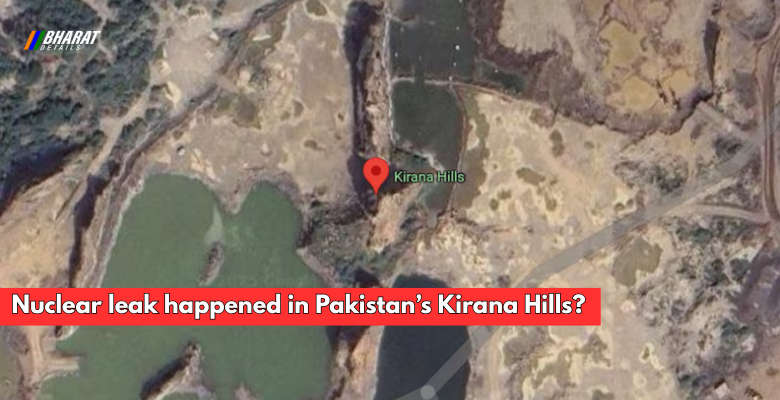No Radiation Leak in Pakistan’s Kirana Hills Confirms IAEA

No Radiation Leak in Pakistan’s Kirana Hills – that’s the official word from the world’s top atomic agency, putting to rest a wave of online speculation that gripped the internet after recent India-Pakistan tensions.
In the midst of swirling rumors, flight tracking alerts, and sensational headlines, the International Atomic Energy Agency (IAEA) has stepped in to clarify — there was no radioactive incident at any Pakistani nuclear facility.
Let’s unpack what really happened, what was claimed, and how each side responded.
Contents
What Sparked the Rumors?
It all began when social media and certain foreign media outlets started suggesting that Indian airstrikes during Operation Sindoor had hit Kirana Hills, a region believed to host underground nuclear tunnels in Pakistan’s Sargodha district.
These rumors intensified with:
- Claims that a U.S. Department of Energy aircraft, often seen during nuclear crises like Fukushima, was spotted near Pakistan.
- Reports of an Egyptian aircraft allegedly bringing boron, used to control radioactive leaks, into Pakistan.
But were these claims true?
IAEA Sets the Record Straight
In response to global concerns, Fredrik Dahl, spokesperson from IAEA’s press department, stated in an email to TOI:
“We are aware of the reports. Based on information available to the IAEA, there was no radiation leak or release from any nuclear facility in Pakistan.”
This statement was echoed again in a query response to The Indian Express.
For the uninitiated, the IAEA’s Incident and Emergency Centre, established in 2005, coordinates international responses to radiation emergencies. They’ve confirmed that no such alert was triggered in this case.
What India Said
Indian officials were quick to deny the reports. Air Marshal A K Bharti, Director General of Air Operations, responded cheekily during a press briefing:
“Thank you for telling us that Kirana Hills houses nuclear installations. We didn’t know about it. We have not hit Kirana Hills and whatever is there.”
He emphasized that no nuclear site was targeted during Operation Sindoor, which focused on specific military targets, notably the Mushaf Air Base near Sargodha.
MEA Also Denies Nuclear Angle
India’s Ministry of External Affairs (MEA) backed the IAF’s statement. Spokesperson Randhir Jaiswal clarified:
“Our military action was entirely within the conventional domain. Reports suggesting Pakistan’s National Command Authority meeting were later denied. Pakistan’s government officials have denied the radiation claims on record.”
Jaiswal also dismissed any notion of nuclear brinkmanship, asserting that India does not yield to nuclear blackmail and has always promoted stability through diplomatic and conventional means.
Pakistan’s Reaction and Clarifications
Pakistan’s ISPR, the public relations wing of their military, confirmed Indian strikes on three airbases: Nur Khan, Murid, and Shorkot — but not Kirana Hills.
Additionally, on May 10, Lt Gen Ahmed Sharif Chaudhry addressed the media and never mentioned any nuclear facility being affected.
The Express Tribune later quoted an ISPR statement dated May 14 about drone activity over various Pakistani cities including Rawalpindi, Gujranwala, and Karachi’s Malir district — but no radiation leak.
Kirana Hills: A Known Strategic Site
So, what is Kirana Hills?
- Located about 75 km from Khushab, it is home to over ten underground tunnels.
- Believed to be a second-strike nuclear facility, it is closely linked to Pakistan’s defense infrastructure.
- Surrounded by key military airbases, including Sargodha, used by F-16s, making it a valuable asset in times of conflict.
Nuclear Agreement Still Intact
Despite heightened tensions, India and Pakistan exchanged lists of nuclear sites on January 1, 2025, under the Agreement on the Prohibition of Attack Against Nuclear Installations, signed in 1988 and effective since 1991.
This was the 34th consecutive year that both countries exchanged such lists.
This treaty continues to act as a vital confidence-building measure between the two nuclear-armed neighbors.
Amid the fog of war and the chaos of social media, facts often get buried under speculation. Thankfully, global watchdogs like the IAEA and formal military briefings help cut through the noise.
No radiation leak in Pakistan’s Kirana Hills – that’s the reality, as confirmed by international and national authorities alike. While regional tensions may flare, the world can breathe a little easier knowing that nuclear safety hasn’t been compromised.
For more verified updates on geopolitics, defense, and world affairs, stay tuned to Bharat Details.

